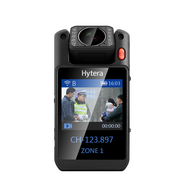Background
A BID is a business-led and business funded body formed to support economic growth and the aim of creating a vibrant destination for those who work, visit or live in the area. A BID is a not-for-profit company funded by an additional levy on participating businesses in the district.
The BID focuses on improving the local environment by developing and implementing Green infrastructure projects. It brings businesses and police services together to enhance safety and security in the area and works to promote the area as a destination worth visiting.
The BID was using a radio system featuring two repeaters installed on two high buildings to cover the area. The BID did not own the buildings, so getting permission to access the repeaters if there was an issue was sometimes a real struggle. While the radio solution was very successful, managing the infrastructure and negotiating licences from Ofcom was becoming a headache.
The Challenge
The BID wanted to expand the coverage area, which meant more repeaters, more sites, an external antenna installation and yet another Ofcom licence. The BID therefore decided to look at different technologies to see if there was another way forward.
The BID was clear that it wanted a like-for-like solution with voice and messaging services similar to that provided by the traditional radio system. They did not require access to the Internet or back office databases.
It also wanted rugged hand portable terminals that looked, felt and operated like a two-way radio, but without the drawback of having to own, operate and maintain infrastructure. But they did not want to rely on a normal consumer mobile phone solution.
The BID approached its long-term technology partner Audiolink to see if it could come up with an alternative strategy.
The solution
As the area had very good 3G/4G coverage, Audiolink suggested the BID look at a PoC solution. PoC provides two-way radio style services, including group, individual and emergency calling and data, such as text messaging. However, as PoC uses a mobile operator’s 3G/4G network, there was no requirement to own and manage the infrastructure.
Audiolink took a strictly neutral view when it came to PoC terminals and supplied handsets from various manufacturers for the BID to trial for a few weeks. The one they liked best was the Hytera PNC370.
Staff liked the fact that the unit has the form factor of a traditional compact, handheld radio and they were impressed by the audio quality. The PNC370 is an easy to operate LTE device with dual-microphone noise suppression, which is helpful on London’s busy, noisy streets. It has built-in GPS and Bluetooth and it is IP55 rated against dust and moisture ingress. APIs support third party applications and it can be managed via a web-based platform.
The BID has now equipped its mobile teams and some local shops and businesses with 130 Hytera PNC370 radios. The PoC platform is provided by PTTi, which also provides the embedded SIMs and radio services to the BID. The teams can now use the radio to make calls and send messages to alert users of any potential threat or public risk, such as a shoplifter in the area.
Audiolink provided training and also helped install a dispatch solution in the BID’s control room. The dispatch solution allows controllers to deliver instant, efficient communications and respond quickly and effectively.
Dispatchers can manage users, talk groups and a list of contacts; view the status of and remotely control a radio; effectively dispatch the nearest user to an incident; record status of and remotely control a radio; record calls; and locate users and calls in real time using the online map.
The results
The BID now has a 3G/4G voice and messaging service similar to its previous radio service, but now with no limits on the coverage area. One reason the local businesses like the solution is that they can use the built-in GPS to track the whereabouts of their staff by using the tracking software and dispatcher, thereby helping to keep staff safer.
In addition, the BID no longer has to worry about buying and maintaining its own radio infrastructure as the mobile network operator takes care of that. It also saves money as it no longer needs to acquire Ofcom licences to operate. Audiolink continues to supply ongoing support to ensure the system remains operational at all times.
System Summary
- Permanent fleet of Hytera PNC370 Radios
- Range of Hytera accessories including single chargers for shops and businesses and six-way chargers for the BID
- Dispatch platform including GPS location, contacts, user and talk group management and call recording
- Standard manufacturer’s warranty
- Deployment, training and remote support provided by Audiolink


